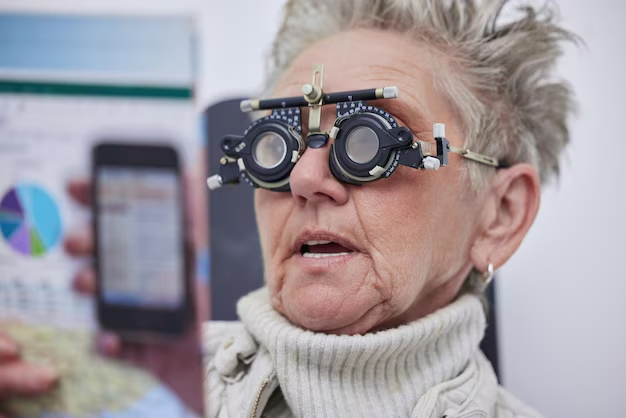Your Guide to Why Is My Vision Getting Worse After Cataract Surgery
What You Get:
Free Guide
Free, helpful information about Cataract FAQ and related Why Is My Vision Getting Worse After Cataract Surgery topics.
Helpful Information
Get clear and easy-to-understand details about Why Is My Vision Getting Worse After Cataract Surgery topics and resources.
Personalized Offers
Answer a few optional questions to receive offers or information related to Cataract FAQ. The survey is optional and not required to access your free guide.
Experiencing Vision Changes After Cataract Surgery? Here's What You Need to Know
Cataract surgery is often lauded for its ability to restore vision to millions of people worldwide. The procedure involves removing the cloudy lens from the eye and replacing it with a clear artificial lens. For many, this results in a dramatic improvement in sight. But what happens when your vision seems to take a turn for the worse after the operation? This concern can be unsettling, but understanding the potential reasons can help in navigating the path to clearer vision.
Why Is My Vision Changing After Cataract Surgery?
Common Causes of Post-Surgery Vision Changes
After cataract surgery, it's not uncommon for patients to notice changes in their vision. While some of these changes are typical parts of the healing process, others may require attention. Here are some common reasons why vision may seem worse after surgery:
Posterior Capsule Opacification (PCO): Often referred to as a secondary cataract, PCO occurs when the membrane left behind during surgery becomes cloudy. This can develop weeks, months, or even years after the initial procedure.
Lens Dislocation: The artificial lens, or intraocular lens (IOL), sometimes moves out of place, leading to vision issues. This dislocation can result from improper positioning during surgery or natural changes in the eye post-surgery.
Retinal Detachment: Though rare, cataract surgery can increase the risk of retinal detachment, where the retina separates from the back of the eye, causing blurry or partially lost vision.
Infection or Inflammation: Post-surgical infections or inflammation inside the eye can impair vision until effectively treated.
Refractive Errors: While cataract surgery often improves vision, some patients may still require glasses or contact lenses to correct residual refractive errors not addressed by the IOL.
Healing Process and Its Impact
It's important to understand that vision fluctuations can also be a part of the natural healing process. Many patients experience some degree of blurriness, glare, or halos at night shortly after surgery. This usually improves over time as the eye heals and adjusts to the new lens.
What to Expect From the Healing Process
Immediate Post-Surgery Changes
Right after the surgery, it is typical for patients to experience:
- Blurriness: The eye may take a few days to adjust to the new lens.
- Light Sensitivity: This is common initially and usually subsides as the eye heals.
- Redness: Mild redness is a normal response and often resolves within a week.
Patience is Key
While the healing process can vary, it generally takes several weeks for the eye to stabilize fully. During this time, it's crucial to:
- Follow all post-operative care instructions from your eye care professional.
- Use prescribed eye drops to aid healing and prevent infection.
- Avoid strenuous activities that could strain the eye.
Understanding Secondary Cataracts
What Are Secondary Cataracts?
Secondary cataracts, or PCO, are not uncommon. They develop when epithelial cells remaining in the eye after cataract surgery grow over the back of the lens capsule, causing cloudiness.
Treatment for PCO
Fortunately, PCO is treatable. A straightforward, outpatient procedure called YAG laser capsulotomy can effectively resolve this issue. During the procedure, a laser creates an opening in the cloudy capsule, restoring clear vision for most patients.
When to Seek Help
Recognizing Symptoms of Complications
While some post-surgery symptoms are normal, certain signs indicate it's time to contact your eye care provider:
- Sudden Vision Loss: This is a medical emergency and requires immediate attention.
- Severe and Persistent Pain: This could indicate complications beyond typical healing.
- Increased Redness or Swelling: Persistent inflammation might suggest infection.
Navigating Your Follow-Up Care
Regular follow-up appointments are crucial after cataract surgery to monitor healing and address any complications promptly. Be sure to attend all scheduled visits and discuss any concerns with your eye care professional.
Practical Tips for Post-Surgery Care
To ensure the best recovery and results, consider these guidelines:
- 👓 Wear Sunglasses whenever you go outside in the days following surgery to protect your eyes from UV light.
- 🚫 Avoid Rubbing Your Eyes to prevent irritation or dislocation of the lens.
- 💤 Follow Rest Guidelines: Give your body and eyes plenty of time to rest.
- 💧 Schedule Eye Drops: Use them diligently as prescribed to prevent infection and reduce inflammation.
The Importance of Balanced Expectations
Realistic Outlook
While many experience significantly improved vision post-surgery, others might need additional time or further procedures to achieve optimal results. Setting realistic expectations and maintaining regular communication with your healthcare provider can ease the journey through recovery.
By understanding the multiplicity of factors influencing post-surgery vision and aligning your expectations accordingly, you empower yourself to navigate the complexities of recovery with greater ease. Balancing hope with informed caution allows for a healthier approach to surgical outcomes, guiding you back to a clearer, brighter world.
What You Get:
Free Cataract FAQ Guide
Free, helpful information about Why Is My Vision Getting Worse After Cataract Surgery and related resources.

Helpful Information
Get clear, easy-to-understand details about Why Is My Vision Getting Worse After Cataract Surgery topics.

Optional Personalized Offers
Answer a few optional questions to see offers or information related to Cataract FAQ. Participation is not required to get your free guide.


